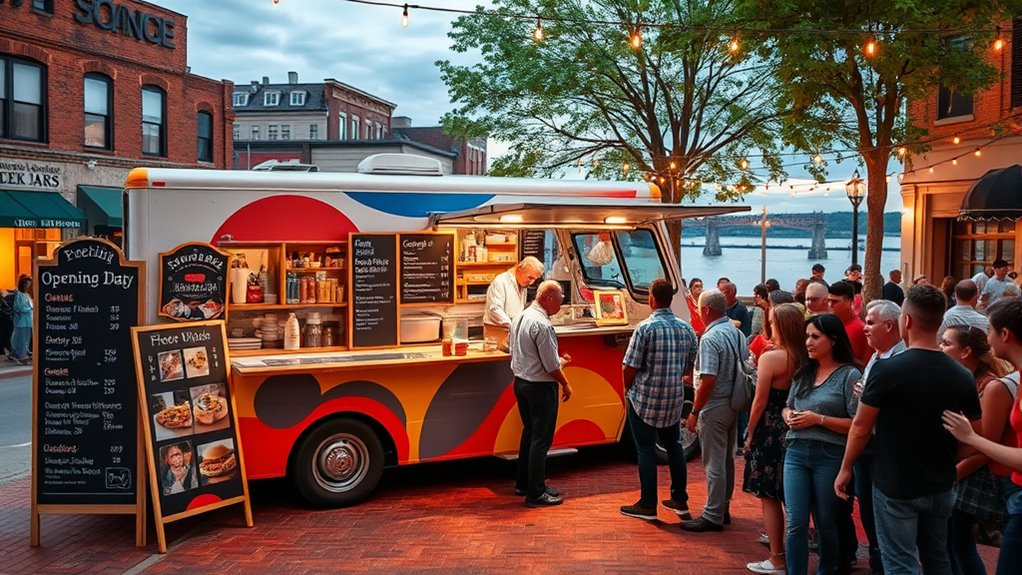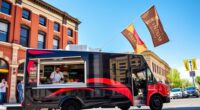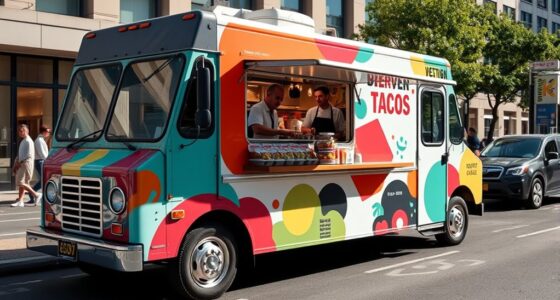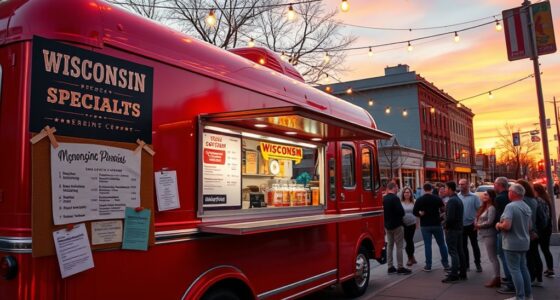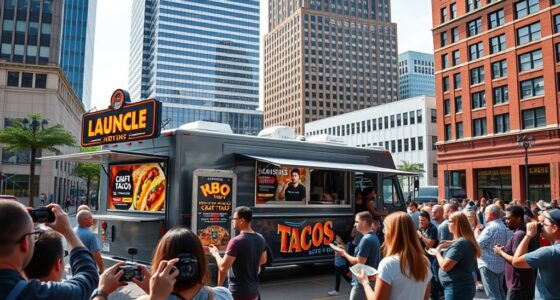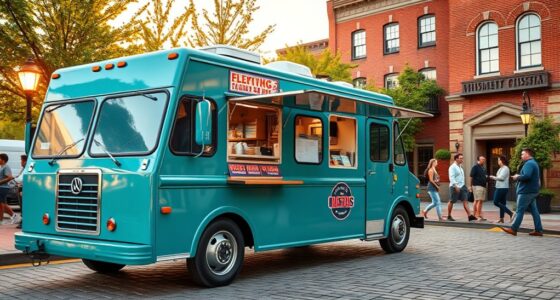To open a food truck in La Crosse, Wisconsin, you’ll need permits like an Outdoor Mobile Food Vendor license and health department approvals, which include inspections and equipment standards. Expect costs from $15,000 for a used truck to over $50,000 for a new one, plus permits and insurance. Choose prime locations that comply with zoning laws, develop a focused menu, and craft a marketing plan. Keep exploring to discover detailed steps for a successful start.
Key Takeaways
- Secure necessary permits including an Outdoor Mobile Food Vendor License and health department approvals, ensuring compliance with Wisconsin and La Crosse regulations.
- Budget for truck costs ranging from $15,000 to over $125,000, plus additional expenses for equipment, permits, insurance, and marketing.
- Choose suitable locations such as commercial or downtown districts, and obtain property owner written authorization for private land vending.
- Develop a focused menu with 5-15 core items, emphasizing signature dishes and quick preparation to maximize efficiency and customer appeal.
- Comply with zoning laws and municipal restrictions, especially near public venues like La Crosse Center, and plan marketing strategies to build brand awareness.
Navigating Permits and Licensing Requirements
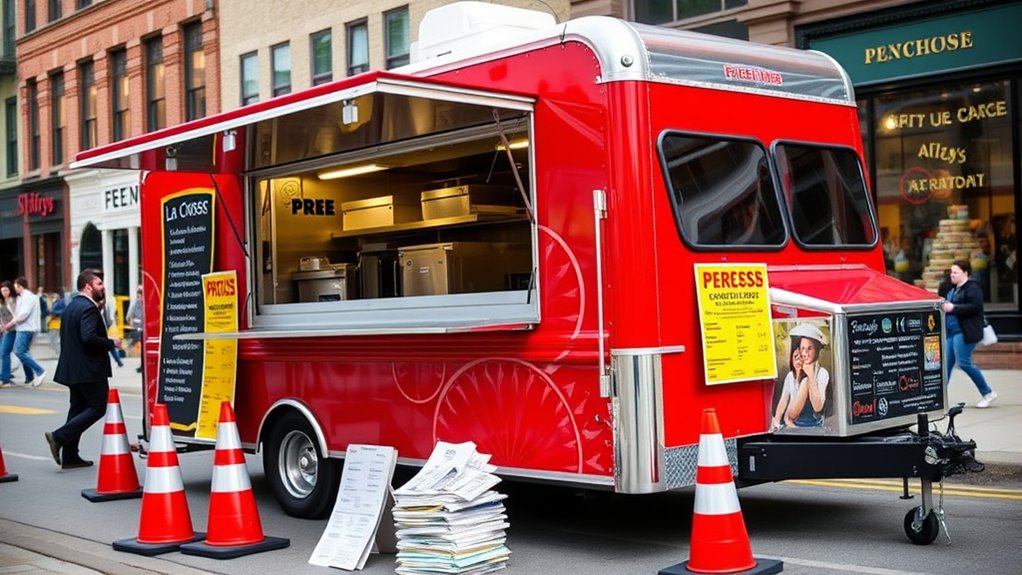
Understanding permits and licensing requirements is essential for operating a food truck in La Crosse, Wisconsin. You’ll need an Outdoor Mobile Food Vendor License to vend on public property, with temporary permits available for 90 days for $60. Submit your application in writing to the City Clerk at least 15 days before you plan to start, including proof of identity, Wisconsin Seller’s Permit, county or state food permit, vehicle registration, insurance, and property-owner authorization if on private land. Be aware of sales restrictions near La Crosse Center during certain times. Additionally, you’ll need state licenses, such as the Mobile Food Establishment and service-base licenses, ensuring compliance with Wisconsin Food Code and equipment standards. County health review and approval are also required before launching your mobile food operation. Each stand or unit must also obtain a separate license, and compliance with municipal ordinance provisions is mandatory.
Understanding Health and Food-Safety Standards
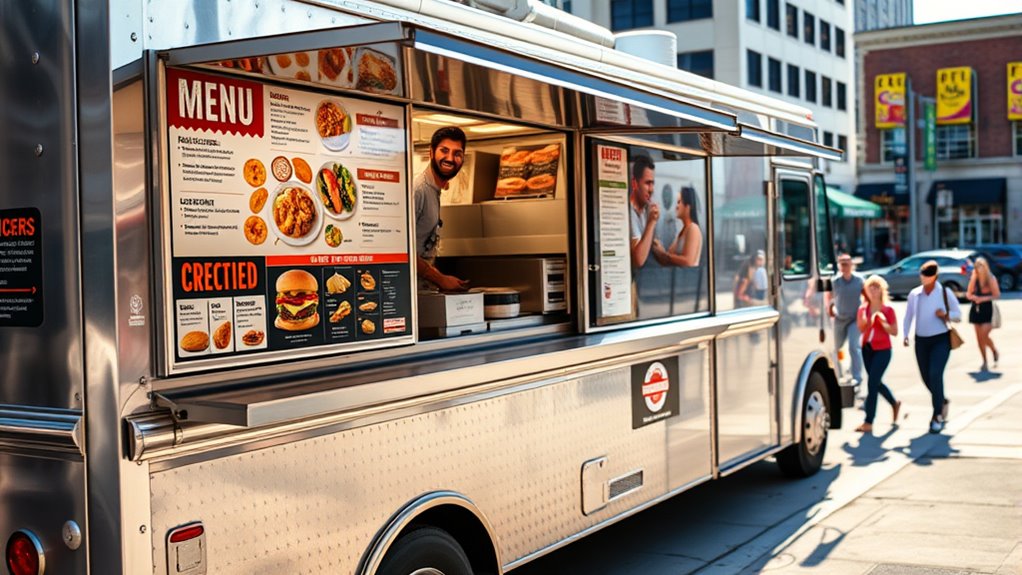
Maintaining proper health and food-safety standards is a key part of operating a food truck in La Crosse. You’ll need to comply with the La Crosse County Health Department’s licensing and inspection requirements, including submitting detailed plans and menus for approval with a $250 fee. Your equipment must be NSF or ANSI certified and permanently installed. Handwashing stations must be hands-free, with hot water, soap, and towels. A three-compartment sink is typically required unless you only sell prepackaged foods. You must keep food at safe temperatures using insulated containers or coolers. Employees should be trained in food safety, hygiene, and allergen awareness. Finally, a Person In Charge must always be present to oversee safe operations, although certification isn’t mandatory. Ensuring proper food safety training is crucial to maintain compliance and protect public health.
Estimating Costs and Budgeting for Your Food Truck
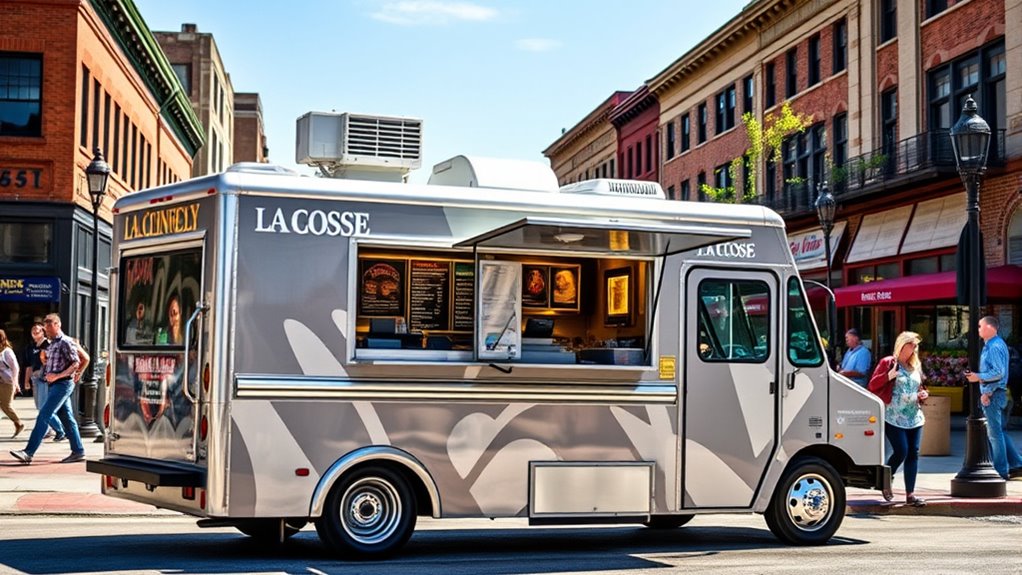
Estimating costs and creating a realistic budget are essential steps before launching your food truck in La Crosse. Start by considering the truck itself; new models range from $50,000 to $125,000, while used trucks cost $15,000 to $50,000. Retrofits and equipment can add $25,000 to $50,000, and onboard generators cost $1,500 to $10,000. Don’t forget permits and inspections, which can total $100 to $500. Licensing, insurance, and compliance fees may sum from $2,000 to over $28,000. Initial inventory, serveware, and POS systems might cost $1,500 to $6,000. Marketing expenses, including branding, website, and promotional materials, can range from $1,200 to $10,000. Budget carefully to cover ongoing costs and unforeseen expenses, ensuring your food truck’s successful launch. Accurate budgeting is critical to avoid cash flow issues in the early stages of your business, especially when accounting for regulatory requirements and other compliance costs.
Choosing Prime Locations and Zoning Compliance
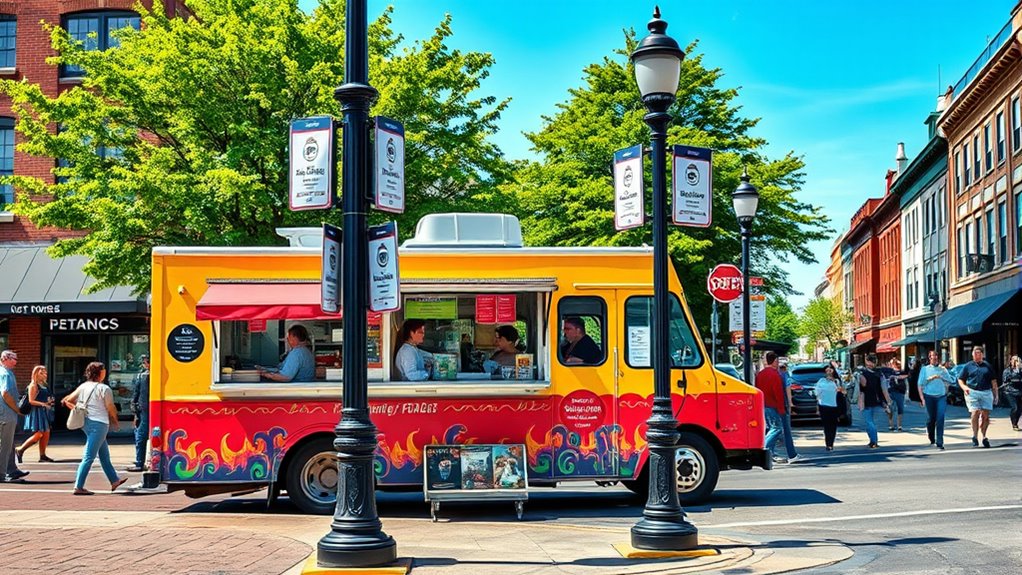
Choosing the right locations for your food truck is key to attracting customers and staying compliant with local regulations. You need to operate in zones like commercial, downtown, or certain industrial districts that permit mobile vending. Be aware that public grounds, alleys, and land dedicated to public use generally require special authorization; standalone units are restricted from these areas by city ordinance. Always check parcel-specific rules, as some zones need conditional permits or site-specific approvals. Keep in mind that special events might have different allowances, provided you get the necessary permits. Many cities also require food trucks to have a valid health permit to operate legally. Additionally, understanding zoning restrictions is crucial to avoid potential fines or shutdowns. – Obtain property owner authorization in writing before vending on private land. – Confirm zoning and permit requirements for each location. – Ensure compliance with city restrictions on public property and special events.
Developing a Menu and Managing Operational Constraints
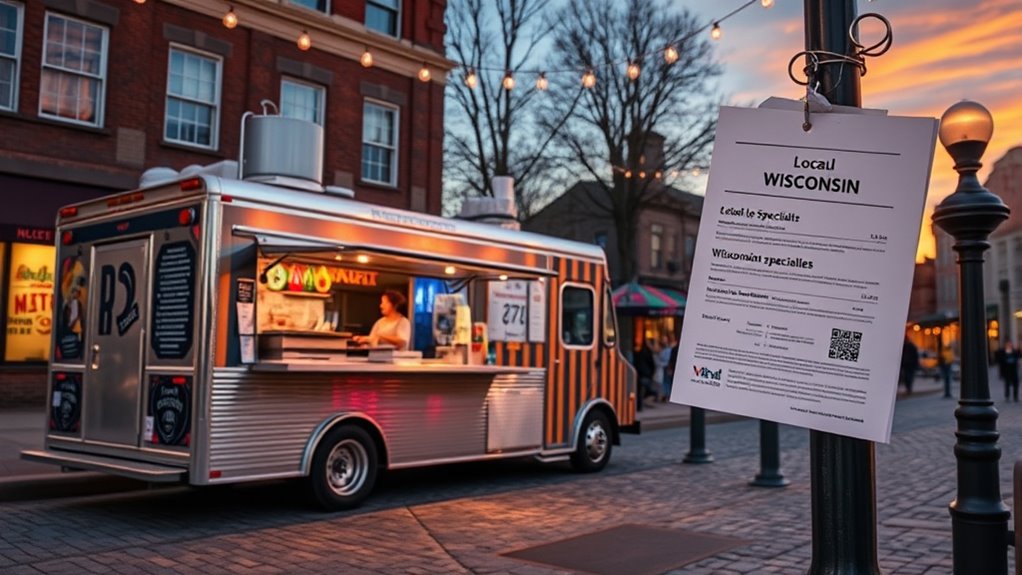
Developing an effective menu for your food truck starts with defining a clear concept that reflects your brand identity, such as gourmet burgers or street tacos. Keep your menu focused with around 5-15 main items to prevent customer confusion and operational overload. Highlight signature dishes to showcase what makes your truck unique and foster loyalty. Use overlapping ingredients across dishes to streamline inventory and reduce waste. Choose items that can be prepared quickly and consistently to ensure fast service and quality. Consider your target market in La Crosse by analyzing local preferences, dietary needs, and price sensitivity. Design the menu to fit your limited space and equipment, minimizing complex or long-cooking dishes. Regularly update offerings seasonally or for promotions to keep customers engaged and maximize profitability. Incorporating quality standards and regulations into your menu development can help ensure compliance and maintain high standards.
Leveraging Marketing Strategies and Event Opportunities
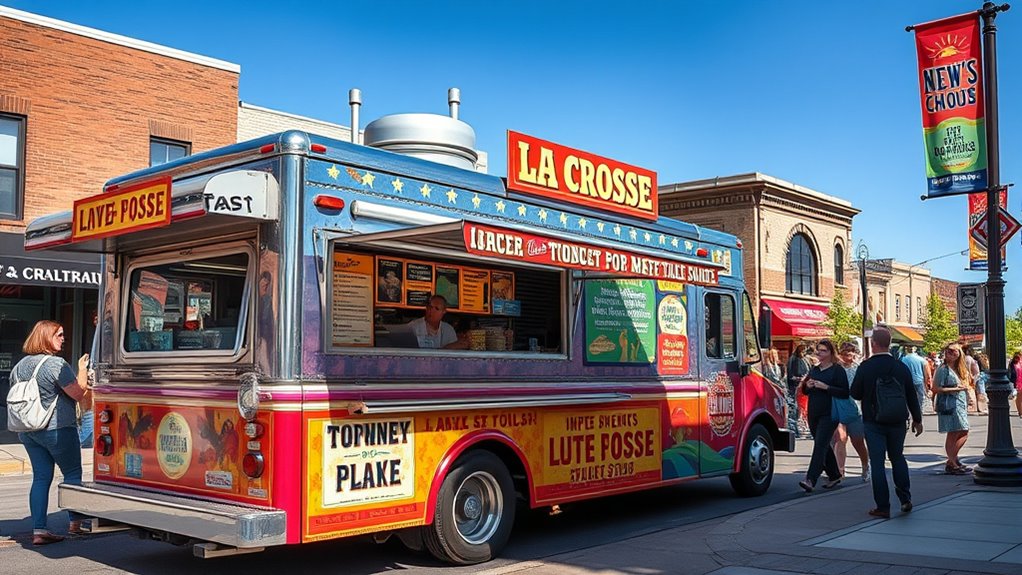
To effectively boost your food truck’s visibility in La Crosse, leveraging strategic marketing and event opportunities is essential. Start by creating a strong brand with a memorable logo, cohesive visuals, and a compelling story that resonates with your target audience. Consistent messaging across your truck, packaging, and online channels builds trust and recognition. Participating in local events like festivals and farmers’ markets allows you to connect directly with potential customers. Partnering with local businesses such as breweries or coffee shops for cross-promotions enhances exposure. Additionally, utilizing social media with engaging photos, contests, and updates helps maintain follower interest. Consider:
- Securing spots at food truck parks for built-in foot traffic
- Collaborating with event organizers for sponsorships
- Distributing flyers and branded merchandise in high-traffic areas
- Understanding how contrast ratio impacts your projector’s image quality can help when creating visual marketing displays or digital content to attract customers.
Frequently Asked Questions
How Long Does the Entire Food Truck Licensing Process Typically Take in La Crosse?
The entire food truck licensing process in La Crosse typically takes about 4 to 6 weeks if you submit complete applications and pass inspections on the first try. However, if you need to make corrections or wait for inspections, it can extend to 8 to 12 weeks or more. Planning ahead and ensuring all documents are accurate helps speed up the process.
Are There Specific Noise or Lighting Restrictions for Food Trucks Operating at Night?
You wonder if there are specific noise or lighting restrictions for food trucks operating at night in La Crosse. While the city and county rely on general noise and nuisance ordinances rather than detailed nighttime rules, they do enforce lighting and safety standards through permits and health inspections. You’ll need to make certain your truck’s lighting meets safety requirements, and noise levels generally adhere to local regulations to operate legally at night.
Can I Operate My Food Truck Year-Round in La Crosse’S Climate?
Picture yourself in a scene straight out of a Dickens novel—winter’s grip in La Crosse is fierce. While it’s possible to operate year-round, you’ll need robust heating, insulation, and snow removal plans to handle sub-zero temps, snow, and icy conditions. Equipment upgrades, reliable access, and staff safety measures are essential. With proper planning, your food truck can brave the elements, but be prepared for a demanding, winter-proof operation.
What Are the Parking Restrictions for Food Trucks on Private Property?
You need written permission from the property owner to park your food truck there. Make sure your setup complies with zoning rules, including parking space size and access requirements. Limit your operation hours and parking spots according to local regulations, usually two adjacent spaces. Avoid obstructing traffic or access points, and keep all permits, insurance, and safety standards up to date. Always maintain documentation for inspections and stay in communication with authorities.
Are There Grants or Financial Assistance Programs for New Mobile Food Vendors?
Did you know that Wisconsin offers over 20 different grants and funding programs for food-related businesses? If you’re starting a mobile food vendor, you can access state grants from DATCP, ranging from $10,000 to nearly $100,000, for equipment and infrastructure. Local programs like Dunn County’s Small Business Grant and regional assistance through the University of Wisconsin Extension can also support your startup, easing costs and expanding your market reach.
Conclusion
Starting your food truck in La Crosse is like steering a ship through busy waters—you need to stay alert to permits, costs, and location currents. With careful planning, a tasty menu, and smart marketing, you’ll navigate smoothly toward success. Remember, every detail is a wave to ride, guiding you closer to your dreams on this flavorful journey. Stay focused, adapt to the tides, and your food truck adventure will be a rewarding voyage.
